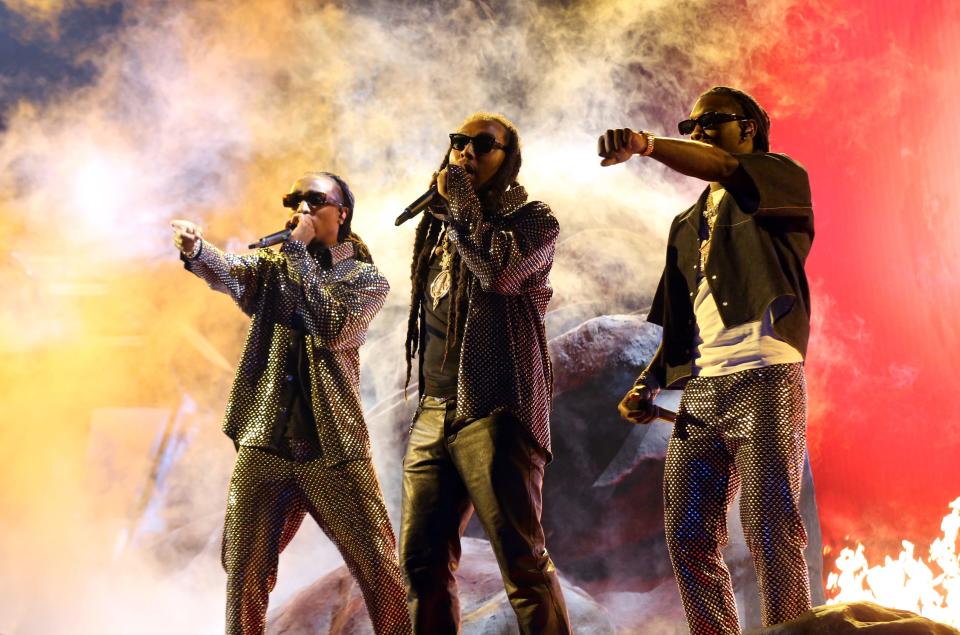The graphic video of Takeoff's death and what it says about our desensitization to trauma
On Tuesday morning, Migos rapper Takeoff was killed during a Houston shooting – a moment that was recorded, posted and even shared by media outlets, like TMZ.
When it comes to celebrity deaths, the instinct for some people is to treat the news as entertainment.
We've seen this exploitation before, particularly when it comes to Black celebrities. Think back to the leaked photos of Kobe Bryant's helicopter crash, and more recently to the bystander-recorded video of rapper PnB Rock's death, which circulated on Instagram in September.
Takeoff was an influential and popular musician, but he was also a human being who deserves respect and compassion, says trauma-informed psychotherapist Lizandra Leigertwood.
"It's quite disgusting that (video is) being circulated, because it's a horrific thing for a family to experience and a traumatic thing for people to bear witness to," Leigertwood says.
"It's dehumanizing. It's as if it's not a big deal, when really it's showing a murder that is horrific."
More on this: Takeoff, one-third of influential rap group Migos, killed at 28 in Houston shooting
The video of Takeoff's death and what it says about those who watch it
Most people would never record the death of a stranger, let alone someone they know. So why do we feel more comfortable consuming famous people's tragedies?
Since the video was released, search trends have been rising on Google in relation to footage and photos of Takeoff's killing. Carla Manly, a clinical psychologist who specializes in trauma, says social media is partly to blame for our desensitization to real-life trauma. The modern fixation on likes, views and clicks often drives people to "do more egregious, unwholesome things for attention," she says — at the expense of others' feelings.
"We don't pause to look at the individual or how it impacts their friends, family and followers. Instead, we get caught up in the sensationalized aspect of it. The commercial aspect of commodifying their experiences in order to make a profit," Manly, author of "Joy from Fear," says.
As of Wednesday morning, the footage, which blurs Takeoff's body, remained on TMZ's website. TMZ did not immediately return USA TODAY's request for comment.

When it comes to high-profile stars, Leigertwood explains, "people sometimes have this idea that because (celebrities) put themselves out there, they owe us inside information about their lives."
However, these videos have consequences. For the general public, repeated exposure to violence desensitizes us, Manly warns, making it even more difficult to extend empathy. And for a victim's loved ones, this adds an additional layer of stress: Now, they have to worry about their trauma living on via the Internet.
"I live in fear every day of being on social media and these popping up," Vanessa Bryant testified in the recent trial over gruesome photos from the helicopter crash that killed her husband. "I live in fear of my daughters being on social media and these popping up."
'This is the real dehumanization of Black people'
On Twitter, the footage of Takeoff's death fueled grief, but also outrage from Black Americans who have repeatedly expressed frustrations over the exploitation of Black deaths, including Bryant, Nipsey Hussle (whose shooting was shared online in 2019) and now, Takeoff.
"People don't necessarily always realize how much they're perpetuating this idea of Black trauma and pain by reposting things without really thinking about it," Leigertwood says, calling it "generational trauma."
"It's been relived and rehashed in the public eye. This is real dehumanization of Black people, their feelings and their experiences that they have to go through all the time."
As human beings, we have a responsibility to know better, to show respect and to grant privacy, Manly says. While the users who circulate these images and clips will likely move on, experts say the trauma for victims' families is lifelong – especially if it's commodified for millions to watch.
Jeffrey Dahmer series is gruesome: It's also No.1 on Netflix. What does that say about us?
This article originally appeared on USA TODAY: Takeoff video shows his death at bowling alley. Where's the empathy?

